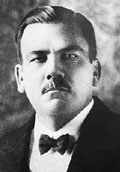 |
Plutarco Elías Calles
b. 25 Sep (?) 1877, Guaymas, Sonora [1]
d. 19 Oct 1945, Mexico City |
| Title: |
Presidente Constitucional de los Estados Unidos Mexicanos (Constitutional President of the Mexican United States) |
| Term: |
1 Dec 1924 - 30 Nov 1928 |
| Chronology: |
27 Sep 1924, election to the office of President of the Mexican United States is declared upon counting electoral votes (cast 6 Jul 1924), session of an electoral college consisting of the members of the Cámara de Diputados (Chamber of Deputies) [2] |
| |
30 Nov 1924 (24:00), took an oath of office as President of the Mexican United States, joint session of the Congreso de la Unión (Congress of the Union), Estadio Nacional, Mexico City [3] |
| |
1 Dec 1924, commencement of term in accordance with Art. 83 of the Constitution of 1917 |
| |
30 Nov 1928, expiration of term |
| Names/titles: |
Baptismal name: Francisco Plutarco Elías Campuzano [4] |
| Biography: |
| Descended, through his natural father, from a prominent Sonoran family of Lebanese descent; orphaned at the age of four; studied in Hermosillo and in Academia de Profesores; upon finishing his studies, he devoted himself to teaching; became inspector of the Boards of Public Instruction in Hermosillo; taught at a Hermosillo school for boys and the Colegio de Sonora; returned to Guaymas (1897), where he taught at school and supervised educational courses at the school of the Society of Craftsmen; served as municipal treasurer of Guaymas and inspector general of education, but was dismissed on suspicions of fraud; briefly worked as hotel administrator (1903); after some time spent at his father's ranch, he quit farming and unsuccessfully applied for a mining concession (1906); was employed as manager at flour mill in Fronteras; registered a small business company, Elías, Smithers y Compañía, which operated in agricultural market until 1911; owned a store in Agua Prieta (1911); as a one-time protégé of José María Maytorena, Governor of the State of Sonora (1911-1915), he was made comisario (sheriff) of Agua Prieta; emerged as one of the revolutionary caudillos in 1913 and joined the Sonoran army fighting against the federal troops; promoted to lieutenant colonel (1913), colonel (1913); was made commander of the troops deployed in Sonora (1914); supported Venustiano Carranza who appointed him Governor and Military Commander of the State of Sonora (1915-1917); defeated Pancho Villa in the battle of Agua Prieta (1 Nov 1915); appointed chief of the military operations in Sonora (1916) and was temporarily substituted by Adolfo de la Huerta as interim governor (1916-1917); elected Governor of the State of Sonora (1917-1919); served as secretary of industry, commerce and labour (1919-1920), secretary of war and marine (1920), and secretary of the interior (1920-1923) in the federal governments; was elected President of the Mexican United States (1 Dec 1924 - 30 Nov 1928); signed into law the amendments to the Constitution, permitting non-immediate reelection and lengthening the presidential term to six years; styling himself as jefe máximo, he was the real power behind three puppet presidents (1928-1934). |
| Biographical sources: "Plutarco Elías Calles and the Mexican Revolution", by Jürgen Buchenau (Denver: Rowman & Littlefield, 2006); "Vida y temperamento: Plutarco Elías Calles 1877-1920", by Carlos Macías Richard (México: Fondo de Cultura Económica, 1995). |
| Elections: |
| Candidate |
Vote (6 Jul 1924) |
| Plutarco Elías Calles |
1,340,634 |
| Ángel Flores |
252,599 |
| others |
24 |
|
| Source of electoral results: Diario de los Debates de la Cámara de Diputados del Congreso de los Estados Unidos Mexicanos / Año I - Período Ordinario XXXI Legislatura / Tomo I - Número 22. |
| |
| [1] |
Plutarco was born, as is most likely, on 25 Sep 1877; the year is certain and he celebrated 25 September as his birthday during all his life. His baptismal record, dated 23 Dec 1878, says, incorrectly, that he was born 27 Jan 1877 (he was brought to his baptism by a brother of his father) and shows his name as Francisco Plutarco Elías Campuzano. |
| [2] |
Diario de los Debates de la Cámara de Diputados del Congreso de los Estados Unidos Mexicanos / Año I - Período Ordinario XXXI Legislatura / Tomo I - Número 22. |
| [3] |
Diario de los Debates de la Cámara de Diputados del Congreso de los Estados Unidos Mexicanos / Año I - Período Ordinario XXXI Legislatura - Tomo I - Número 45. |
| [4] |
In his adolescence he was identified as "Plutarco Calles" in the schools he attended. After re-contacting his father, Plutarco Elías Lucero, with whom he was separated until 1897, he began to insert an "E" between his names as evident from his signature under a resignation dated 1 Oct 1897. From that period he was and remained "Plutarco Elías Calles", signing legal documents with "P. Elías Calles" during his tenure as President of the Mexican United States (1924-1928). "Elías Calles" was henceforth regarded as his compound patronym: his fistborn, for instance, was Rodolfo Elías Calles Chacón. |